
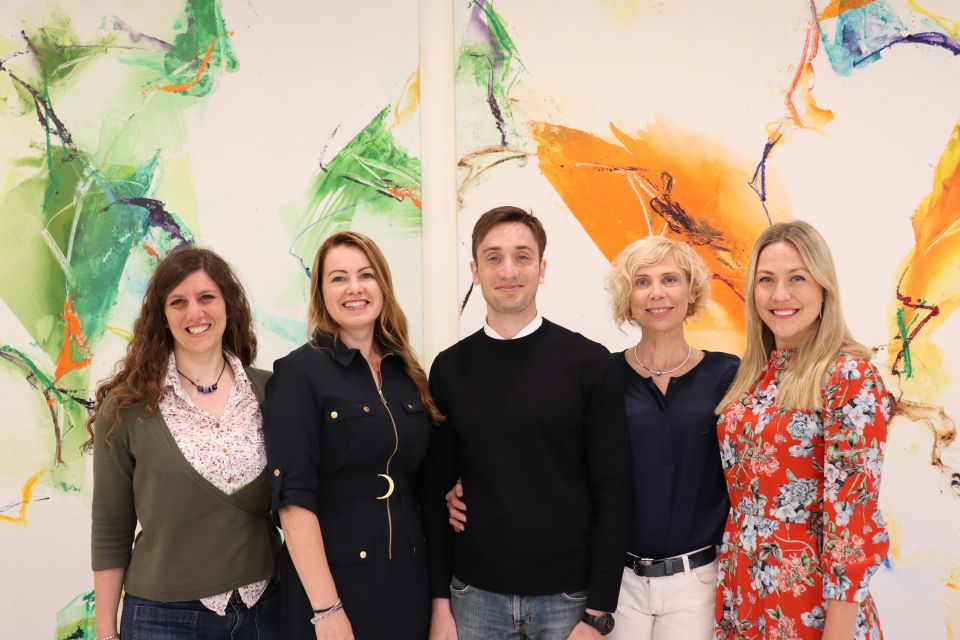
Cite as:
Geiger Susi, Galasso Ilaria, Watts Gemma, Stendahl Emma and Nicola Stephen. 2019. “MISFIRES and Market Innovation: STS Research for Participatory and Inclusive Healthcare.” In Innovating STS Digital Exhibit, curated by Aalok Khandekar and Kim Fortun. Society for Social Studies of Science. August. https://stsinfrastructures.org/content/misfires-and-market-innovation-sts-research-participatory-and-inclusive-healthcare/essay
This project has received funding from the European Research Council (ERC) under the European Union's Horizon 2020 research and innovation programme (grant agreement No. 771217)
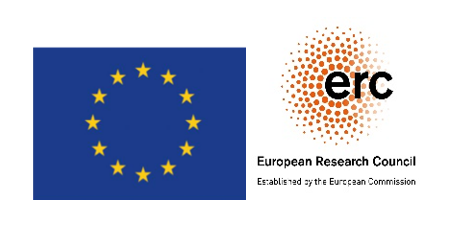
ARTICULATION
NECESSITATION
FRAMEWORKS
INFRASTRUCTURES
EXAMPLES
INTERRUPTION
REGENERATION
CONTEXTS
ENGAGEMENT
This exhibit introduces the MISFIRES ERC Consolidator research project: “MISFIRES and Market Innovation: Toward a Collaborative Turn in Organising Markets” (http://misfires-erc.eu/).
MISFIRES is a new interdisciplinary research program at the intersection of STS and critical market studies, based at University College Dublin. It aims to guide new academic and policy thinking by establishing how: 1) concerned actors voice and mobilise around the notion that a healthcare market has ‘failed’ them; 2) concerned actors seek to negotiate and address these failures; 3) this process may lead to ‘better’ healthcare markets (as defined by the actors).
The project also explores participatory and collaborative strategies in the five cases it researches by helping to open these markets up to the concerns of those who are let down by them. Individual case studies include issues around the assetization of pharmaceutical patents (Hepatitis C), evolving activist strategies around access to medicines (HIV/AIDS), digital activism and user innovation (Type 1 Diabetes), and the use of participatory tools as a response to non-engagement by publics (private and public genomics initiatives).
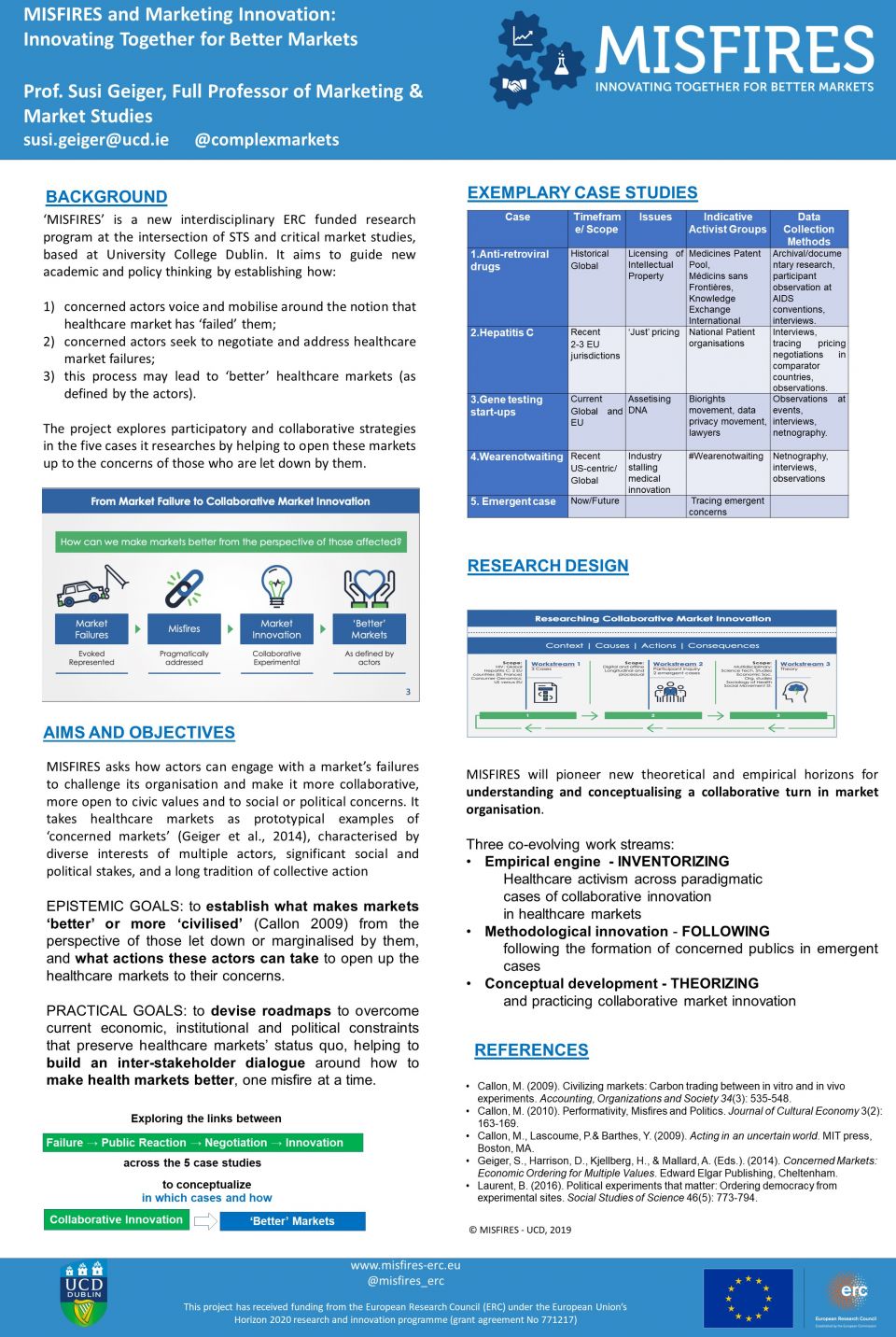
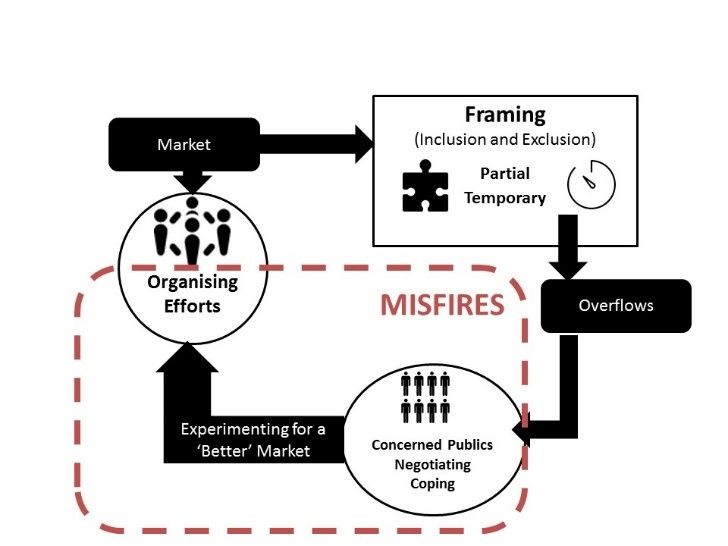
MISFIRES aims to open vital new horizons for researchers and policy makers by offering new ways to analyse and think through the organisation of markets in a more reflective, deliberative and ultimately collaborative manner. We will combine empirical findings from our inquiry into current market-based health activism with extant theory from several social science disciplines to theorise collaborative market innovation. Conceptually, we offer a new vocabulary and perspective for market studies researchers to analyse collaborative action in ‘concerned markets’. We will link our insights to discussions around imagining more moral and civilised markets. By focussing on market-based activism, our findings will add vital new knowledge on the range and impact of patient activism, opening up future avenues of research in the sociology of health and STS. Practically, MISFIRES relates to policies such as the EU Responsible Research and Innovation model, asking important questions on how policy makers, researchers and publics together can identify targets for market innovation in an inclusive and democratic manner. MISFIRES will devise roadmaps to overcome current economic, institutional and political constraints that preserve markets’ status quo, helping to build an inter-stakeholder dialogue around how to make markets better, one misfire at a time.

For its multi-level articulation, MISFIRES relies on the team work of a multi-disciplinary group, combining the work of scholars with different backgrounds, skills and expertise, all of whom are interested and passionate about making healthcare markets more participatory. Currently MISFIRES is driven forward by the coordinated work of the Principal Investigator (Prof. Susi Geiger), the Project Manager (Ms Gemma Watts), two Post Doctoral Researchers (Dr Emma Stendahl and Dr Ilaria Galasso), one Research Assistant (Mr Stephen Nicola), plus two Associated Researchers (Dr Nicole Gross and Dr Nicola Mountford). In the videos below, the MISFIRES team introduce themselves, their contributions to MISFIRES, and the significance of MISFIRES from their personal point of view.
Do these markets ‘work’? Many commentators would argue that they do not: they exclude a great number of people who can’t afford the products on offer (in the Hepatitis C and Orkambi cases), have no access to them (HIV/AIDS), or are unaware of the true value of the market’s ‘goods’ (genomic data). While regulation may alleviate some of these market failures, it often does not succeed in including into the market’s organisation the multiple concerns of a broad range of stakeholders – patients, advocacy groups, care providers, civic society, governments, pharma and generics firms, and insurers. This fact has caused some activists and advocacy groups to start focussing on the inner workings of markets and on suggesting and implementing alternatives to the current rules, tools and practices through which that market is organised. In the HIV/AIDS example, for instance, a UN-supported and activist-led patent pool has started to provide alternative licensing mechanisms (www.medicinespatentpool.org), and an Access to Medicines Index names and shames pharmaceutical companies’ patent licensing practices (www.accesstomedicineindex.org). More broadly, activists have started to interrogate the fundaments of the global patent and innovation system in healthcare.
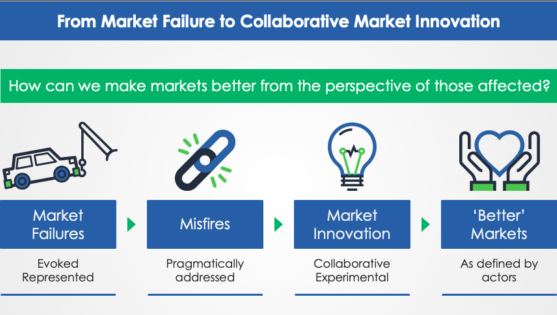
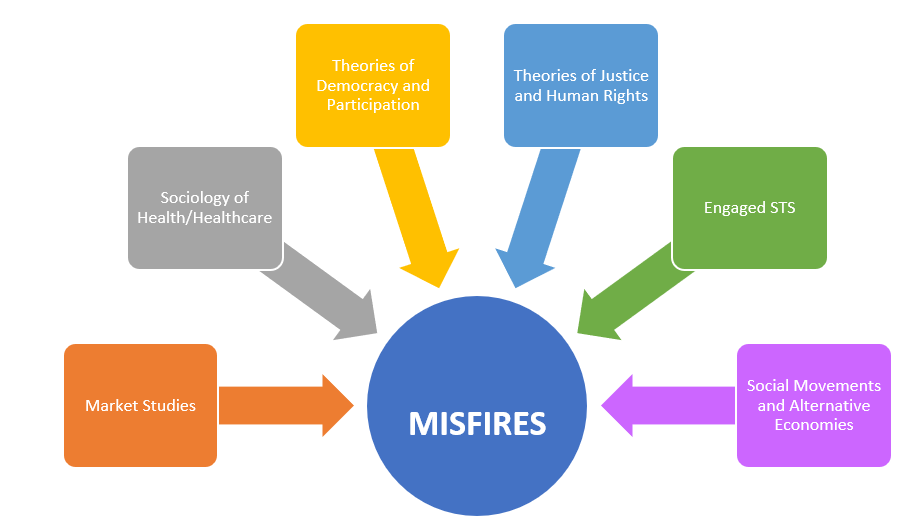
MISFIRES’ conceptual development draws on and overflows into multiple streams of social science research. From STS, we draw on several traditions including engaged STS and the social studies of markets – a theorising on markets that was inspired by Actor-Network Theory. From philosophy, we are inspired by theories of justice and democracy. Organization studies and post-Marxist economics gives us valuable guidance around social movements and alternative economies, respectively. Finally, we stand on a long tradition of research in the sociology of health and healthcare around patient movements and patient organisations.
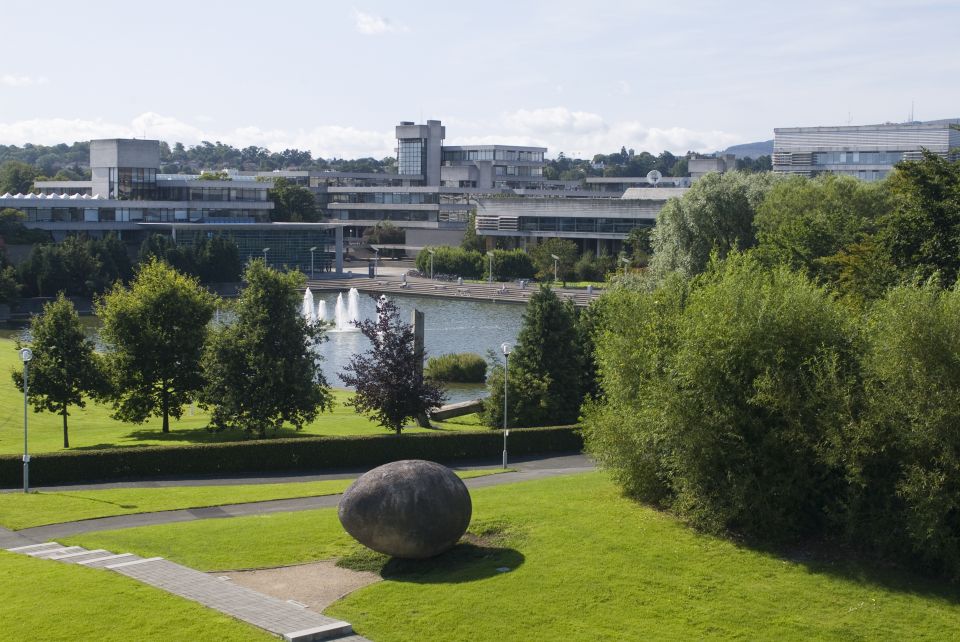
MISFIRES is an EU H2020 European Research Council Consolidator project on market failures in healthcare, located at University College Dublin , Ireland. It started in August 2018 and will run until 2023. The aim of the project is to help make healthcare markets more participatory and to innovate together for better markets. MISFIRES’ aim is to transcend the boundaries between practice, theory and research by exploring and putting in place collaborative means of engaging activists, researchers, policy makers and industry into market innovation – innovating together for better healthcare markets.
For the best development of the research project, the MISFIRES team aims to tap into a diverse array of theoretical perspectives. To this aim, the team is actively engaged in networking activities to establish new contacts and collaborations across a plurality of disciplines, by participating in relevant events related to different contexts and geographies, as well as by organizing interdisciplinary MISFIRES events.
The Workshop "HEALTHCARE ACTIVISM BETWEEN MARKERTSAND MORALS - TUMULTUOUS PASTS, BRIGHT FUTURES?" on September 20, 2019, marks the inaugural workshop in a series of academic and public events as part of the MISFIRES research program. It draws together scholarship and emerging research from disciplines including Science and Technology Studies, Healthcare and Legal Studies to map existing knowledge on healthcare activism and to sketch a future research agenda at the crossroads of ‘upstream’ and ‘downstream’ healthcare activism. Its ambition is to draft an interdisciplinary research agenda that will advance knowledge for the common good.
For 2020, events will include a “Market Activism” track at the EGOS (European Group of Organization Studies) conference in Hamburg, an intervention at the multi-stakeholder partnership conference CSSI in Limerick, and an activist workshop in Dublin.
Flyer with the program of the MISFIRES inaugural interdisciplinary workshop “Healthcare activism between markets and morals”, September 20, 2019.Read more
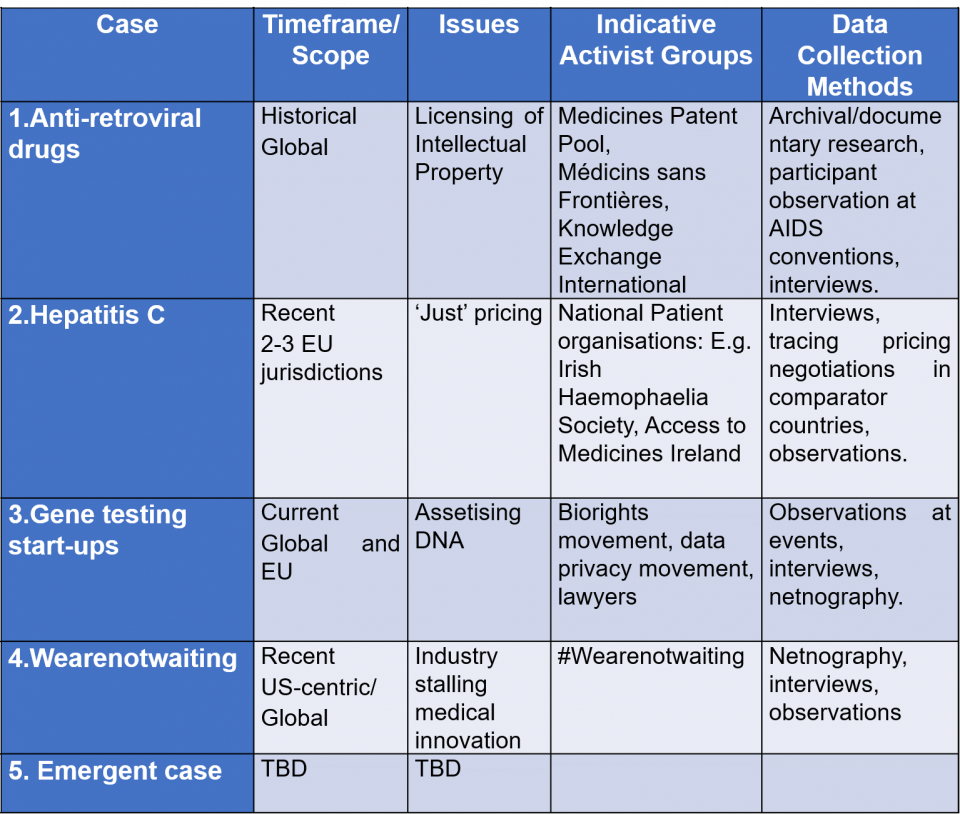
We study different cases of collaborative market innovation, each stemming from a different conceptual vector of market failure – for instance human rights, just pricing, and conceptions of the common good. These cases will provide the empirical grounding for the project, inventorising what market-facing activities and experiments are undertaken by activists in each case and how they interact with the market’s organisation. Cases have been chosen based on their salience and richness: these markets are problematic, significant public gain is involved in making them ‘better’, concerned actors are identifiable, market innovation is ongoing, cases are distributed in time, and they shed light on different market mechanisms to facilitate theorisation. In each case we ask where the notion that the market is failing stems from. Following the most intense controversies to sites, actors or constituencies, we map negotiations, reconfigurations, instrumentations and market experiments, and identify how these reframe the market. Which voices compete and which are silenced in this process? When and how are policy actors invoked? How is market innovation translated into new configurations, and (how) do these instruments compete? How ‘open’ are processes to the voices of those whom the market has failed? How do actors advocate for, build and implement alternative instruments to innovate markets? And importantly: are the resulting market configurations more ‘collaborative’ or ‘civilised’ as a result?
The cases are distributed among the MISFIRES researchers as individual projects, to be later combined to build a broadly applicable normative framework:
This research focuses on diabetes activism, the open data movement, and how Twitter hashtags may be used to foster user-driven innovations. We focus on the hashtag #WeAreNotWaiting, representing a Type-1 diabetes movement that straddles online and offline worlds. The case study is based on Twitter data containing the hashtag #WeAreNotWaiting, observations at public events and interviews with diabetes advocates, patient entrepreneurs, diabetes device manufacturers and government officials. This research hopes to advance the user entrepreneurship concept into areas of societal concern such as healthcare and trace how social movements and user innovation may be aligned through online activism - or, as we call it, connective innovation.
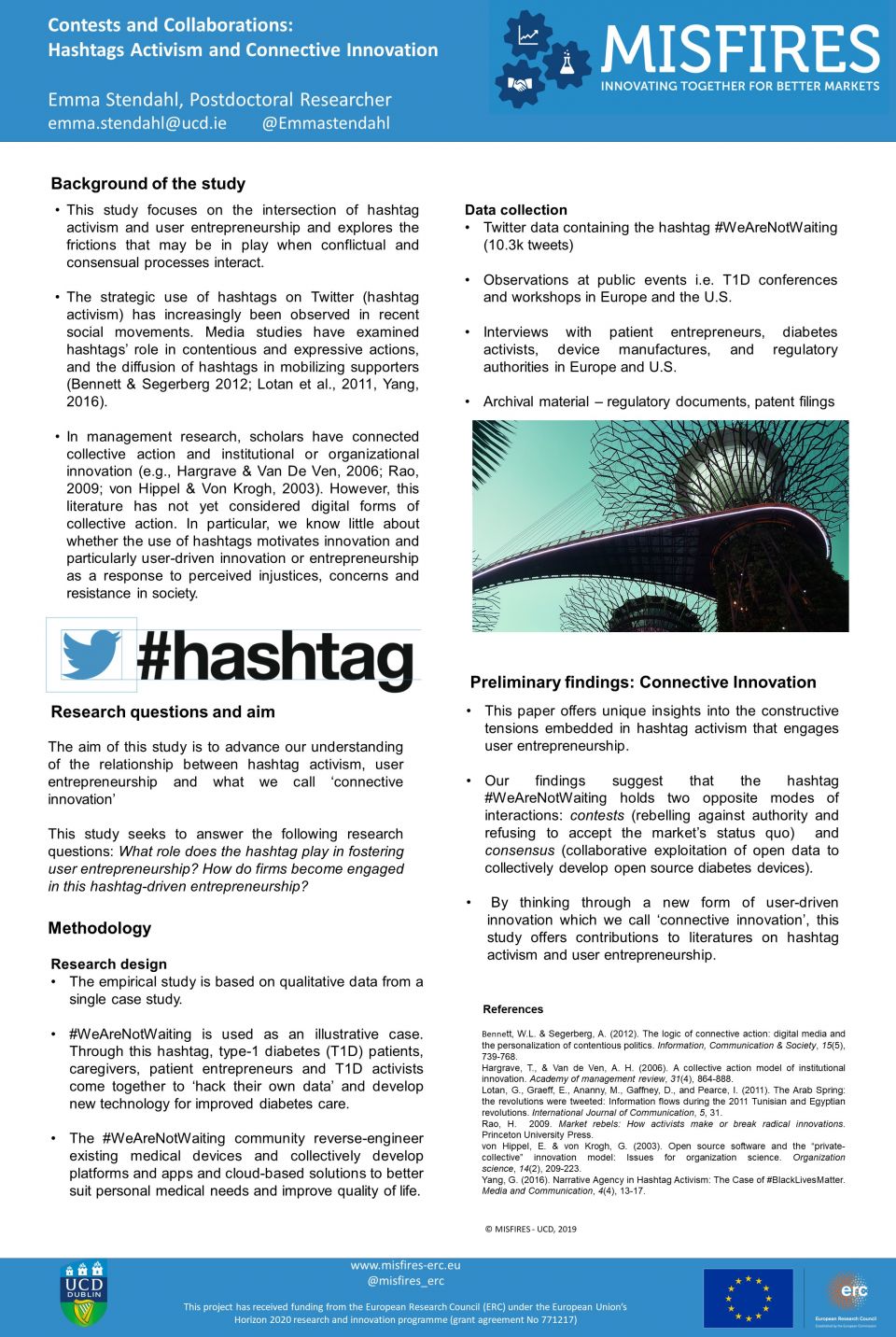
This research investigates to what extent and how different (public or private) organisations collecting health-related data embrace a participative stance toward their participants as well as the general public, and how effective the employed strategies are to give voice and meet the needs of all social groups, including minorities. The final objective is to diagnose and promote the best collaborative formats for the equitable pursuit of the public interest in data-driven initiatives and in medical research
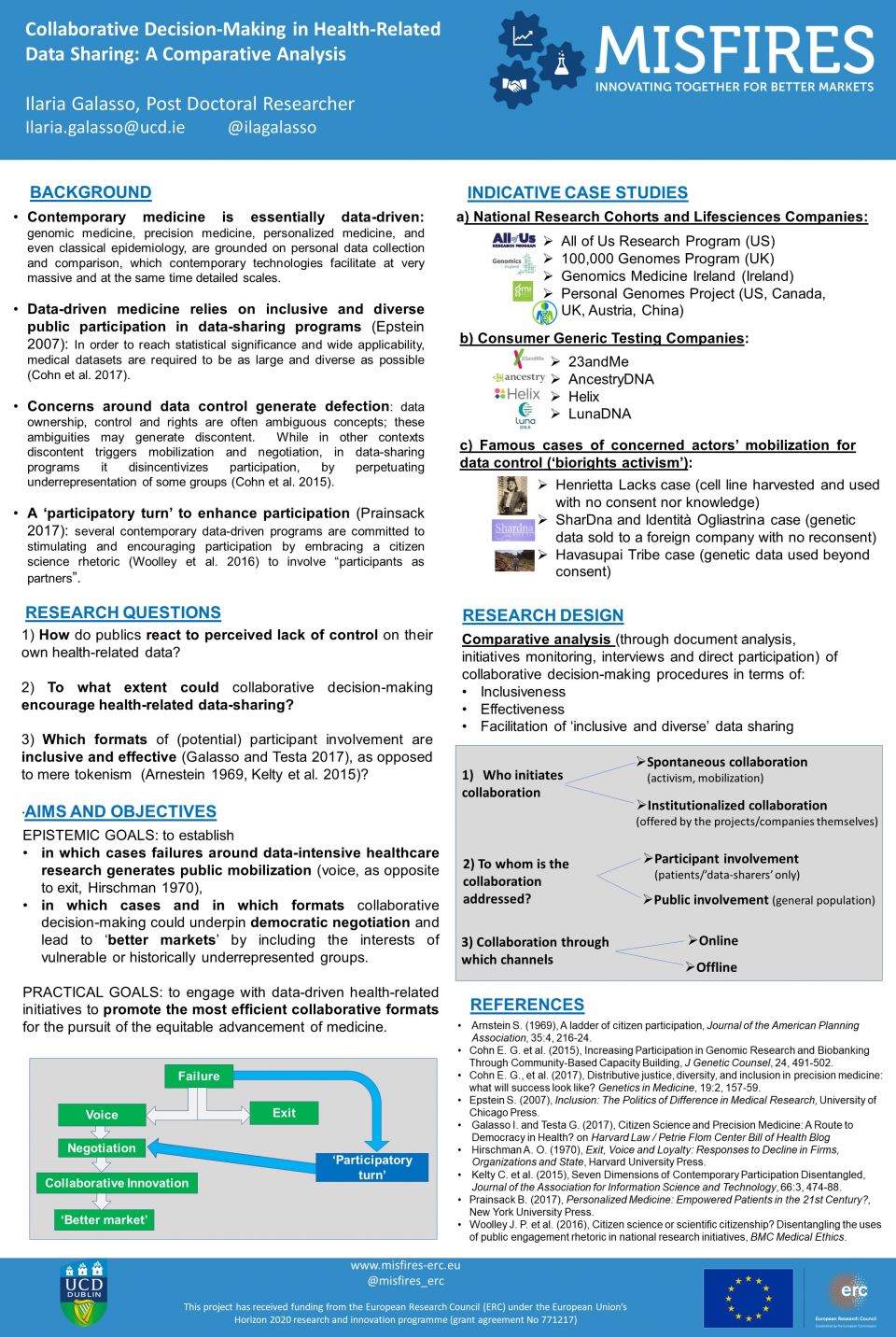
The drug sofosbuvir (Sovaldi) was launched by Gilead Sciences in 2014 and provided the 110 million people estimated to be living with Hepatitis C worldwide with an effective and potentially lifesaving treatment. However,
due to its high prices and limited patient access, sofosbuvir has triggered a global debate about predatory pricing in the pharmaceutical industry. This debate led to 17 activist organisations to filing oppositions to the European patents relating to sofosbuvir and simultaneously raising important questions regarding the multiple ontologies of medication. By focusing on one of the structures behind pricing – patenting – instead of the price itself, this research seeks to highlight the multiplicities and singularities involved in pharmaceutical pricing by asking how different actors view, interact and come to understand what sofosbuvir is and what effects the patent system has on these understandings.
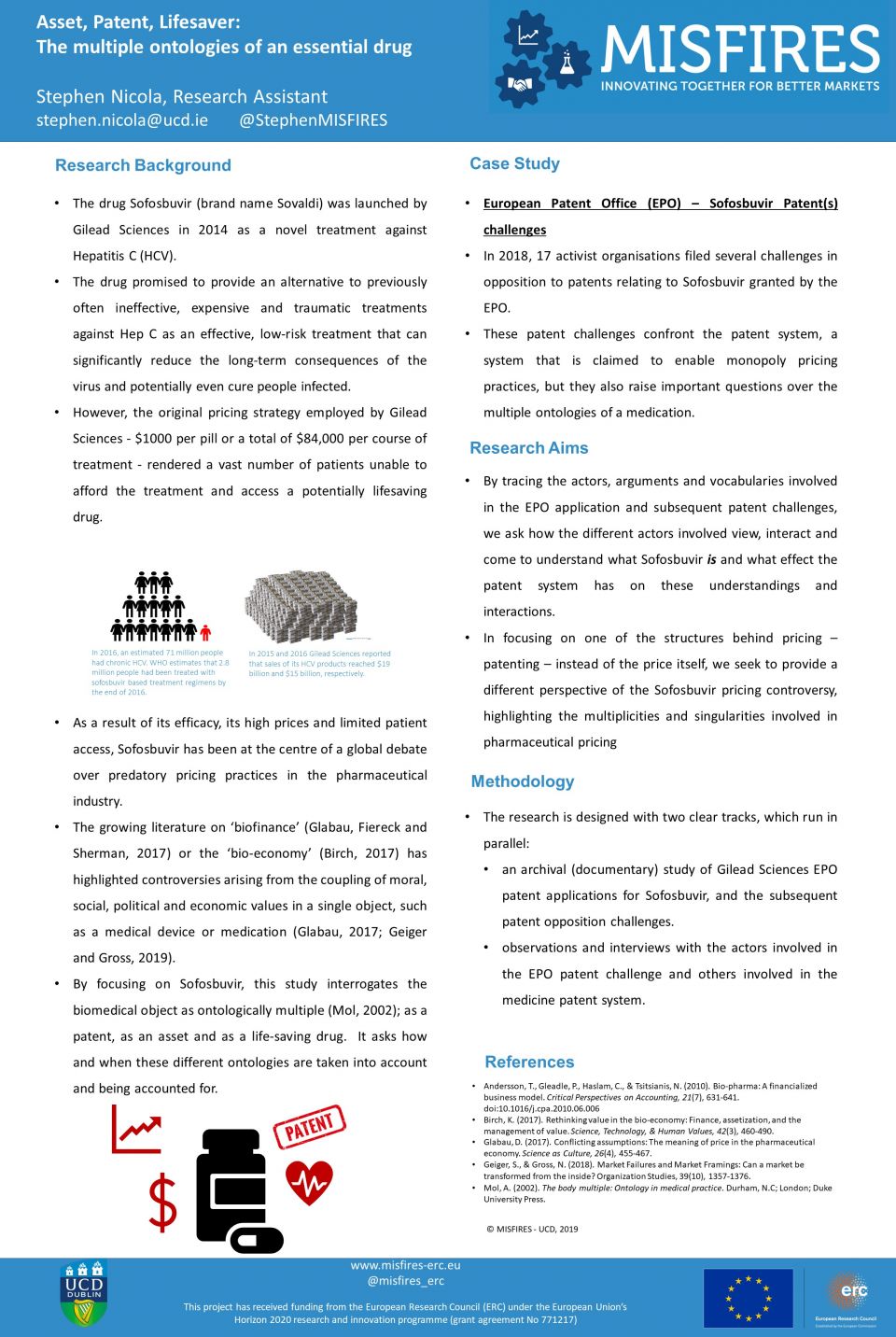

One of the main challenges MISFIRES aims to address is to create and maintain a balance between rapport and critique; local empowerment and the attainment of novel academic knowledge. In thinking through the possibility of a participatory research design to study collaborative market innovation, MISFIRES seeks to use participatory research not just as “another managerialist technology” (Blackstock et al. 2015), but rather as a necessary stage to deeply grasp and conceptualise collaboration in market innovation. In the spirit of our participatory research design, engaging in digital research also means engaging as digital participants. Our project-centred web-based hub aims to provide a reflective and interactive space for practitioners and academics. It will
seek to present the questions investigated throughout the project in a manner that invites reaction and reflection and to capture and report diverse participant perspectives. This web-based hub includes features such as a Twitter feed, an open discussion forum and a blog space in which team members, research participants and the wider public can participate.
In the blogs featured below, MISFIRES’ researchers describe the interruptions the project has been causing in their own lives as well as those they seek to cause through the project, aligned with the MISFIRES spirit. This ranges from interrogating established common practices and thinking in their individual disciplines (Susi), the modus operandi in which they have operated or they want to operate (Ilaria and Gemma), the way researching healthcare has affected them as researchers and as human beings (Emma), and their personal and academic stance (Stephen).
Prof Susi Geiger about what drove her to initiate the MISFIRES projectRead more
Stephen Nicola's blog on the importance of MISFIRES around issues of overpricing and relationships between pharma industries and patientsRead more
Dr Emma Stendahl's story: becoming a patient reseracher and, with MISFIRES, also a diabetes advocateRead more
Dr Ilaria Galasso's blog about her (apparently) tortuous path from a Department of Philosophy to MISFIRESRead more
The ERC MISFIRES project started one year ago, in August 2018, and it is still at a very preliminary stage. At the current stage, more than actually “regenerating”, we are “studying how to regenerate”: we are now framing the research design, collecting preliminary data, insights, interdisciplinary contacts and feedback.
Our hope is that by the end of the project in 2023, we will be able to say that MISFIRES “regenerated” both academic thinking and the healthcare market, by engaging with industries, policy makers and concerned publics, and by facilitating an unprecedented inter-stakeholders dialogue among them for the collaborative innovation of the healthcare market with a sense of justice.

MISFIRES builds insights on empirical data from historical (activism around HIV drugs), recent (Hepatitis C patents), current (genetic data control), and emergent (digital activism around Type 1 Diabetes, and and another exemplar case will be determined later in the project) cases. The MISFIRES researchers observe and analyse different conceptual vectors of market failures - human rights, just pricing, and common good - in different geographic and contemporary contexts, in each case drawing the link “failure-mobilization-negotiation-better market” to better understand and possibly facilitate this link in current and emergent cases.
As for the geographical context, the MISFIRES project is located in Ireland, in the European Union. The cases currently analyzed are located in Europe and North America, and, although with significant differences among different countries, they are contextualized from an understanding of healthcare markets in Western capitalist and liberal democracies. However, we also follow cases and maintain academic contacts in countries outside the Western area. We aim, at a later stage of our project, to combine our results with those coming from other research groups in other areas of the world, in order to possibly extend the reach of our research at a global level, also including the global South.
MISFIRES is not only research, it is also academic activism. Apart from expanding academic knowledge around what makes markets ‘better’ and what actions can be taken to open up the healthcare markets to multiple concerns, the final aim of MISFIRES is a practical one: to make healthcare markets more participatory - innovate together for better markets. We want MISFIRES to become activism by actively contributing to implementing a “collaborative turn” in healthcare markets: we aim to encourage, facilitate and steer collaborative dialogues among all the relevant stakeholders and concerned actors, including pharmaceutical industries, policy makers, as well as concerned patients and publics. To this aim, we need to engage with all of them, to understand their interests, their concerns and their expectations. In particular, as our definition of ‘better’ markets coincides with the definitions by those let down and marginalized by them, we need to engage with these actors to learn from them, and to build our definitions on the basis of theirs. We follow online platforms and events where healthcare activists and marginalized groups express their voices, and we are especially interested in including them in our fieldwork interviews.
Symmetrically, as we want MISFIRES to be engaged with healthcare activism and with all relevant stakeholders, we also want healthcare activists and all relevant stakeholders to be engaged with MISFIRES. Consistently, one of our priorities is to let MISFIRES be known and understood by all concerned actors, well beyond academia.
While the early shaping of MISFIRES and our dissemination activities have primarily addressed an academic community, we are now working to make our insights and research process more accessible and understandable: these include our blogs and twitter campaigns, the production of project leaflets, a fully accessible website, the organization of a film festival, and an activist workshop in 2020.
Program of MISFIRES reading group on market studies: 7 thematic meetings to comparatively discuss selections of indicative texts relevant to MISFIRES and to market organization and innovation.
Prof Susi Geiger designed this reading course with help and inspiration from Mr Gianluca Chimenti...Read more